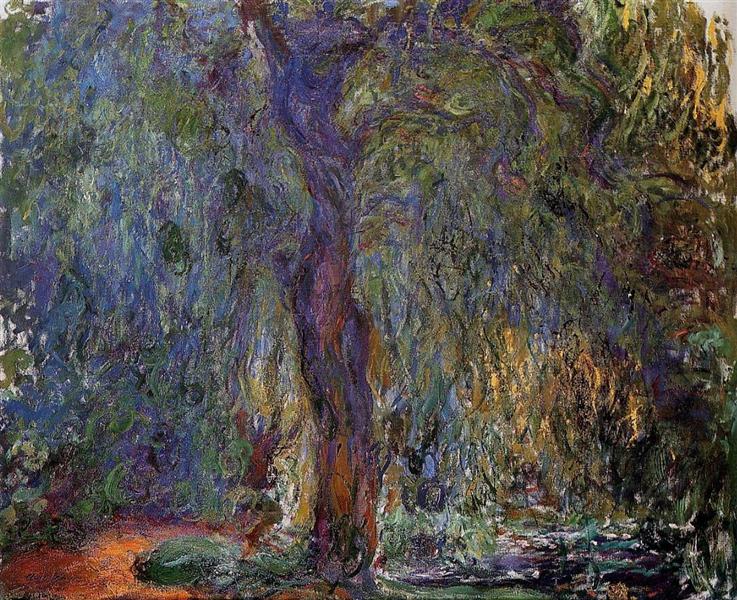Description
The painting "Sauce Llorón" by Claude Monet, created in 1919, represents an essential component of the last stage of the work of the master impressionistic. This work stands out for its masterful use of light and color, as well as the way in which the artist's emotions reflect in a period marked by sadness, due to the death of his wife Camille in 1911 and the impact of the first World War. On this canvas, the crying willow is not only a tree, but a symbol of grief and melancholy that evokes a deep personal and emotional connection.
Monet uses an almost abstract approach to this painting, where the representation of the willow is transformed into a vibrant field of color and movement. The hanging leaves of the willow, painted in various tones of green and yellow, create a sensation of density and movement, as if the tree were crying, referring to its title. The technique of loose and fast brushstrokes, characteristic of impressionism, gives the work a rich texture that transmits the vitality of nature in contrast to the implicit sadness of the emotional content of the piece.
The composition focuses almost exclusively on the willow, excluding the presence of human figures or elements of a broader landscape. This directs our attention completely to the tree, which seems to float on a water background in a reflex game. The surface of the water is represented with soft blue and green tones, where the reflex of the willow is mixed with the environment, creating a game of symmetries that adds a layer of depth. This approach to water is recurring in the works of Monet, who often explored the interaction between aquatic elements and light.
As for color, Monet displays a rich and harmonious palette that emphasizes the serenity of the natural environment. The blue tones of the water are contrasted with the green of the willow, creating a visual contrast that, however, feels closely connected. The quality of the light, a constant concern of Monet, is observed in how it is filtered through the leaves, generating a light effect that makes the spectator experience not only the image, but also the atmosphere of the place.
In addition to his artistic career, Monet was a pioneer in the representation of the ephemeral, which is reflected in his treatment of time and perception in this work. The "crying" captures an instant that seems to be in perpetual movement, a testimony of the natural environment in constant evolution. This work is aligned with other Monet series, such as those of water lies, where it also addresses water and nature issues with a gripped approach in light and color.
In the context of art history, "Sauce Llorón" is presented as a visual regret, a bridge between the beauty of the landscape and the weight of human emotions. Monet, at first an innovative, throughout his career became a master in the exploration of subjectivity through color and light. In this sense, the work is not only a representation of nature, but it stands as a reflection of the artist's soul, in which sadness and beauty coexist, inviting the viewer to immerse himself in an aesthetic experience that is so personal as universal.
KUADROS ©, a famous paint on your wall.
Hand-made oil painting reproductions, with the quality of professional artists and the distinctive seal of KUADROS ©.
Reproduction service paintings With a guarantee of satisfaction. If you are not completely satisfied with the replica of your painting, we refund your money 100%.

